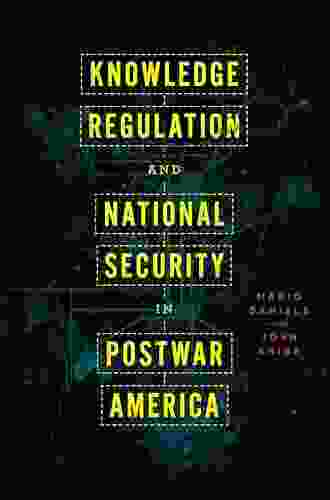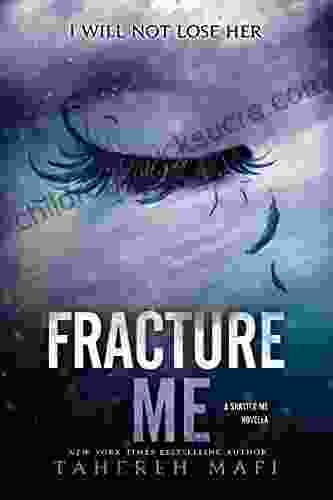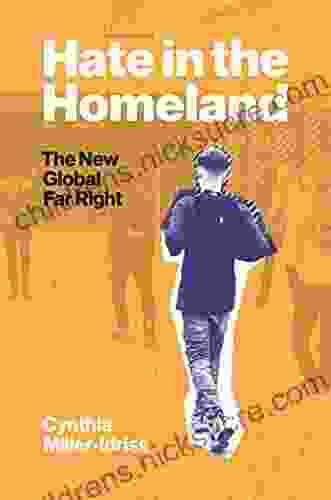How Postwar America Controlled Knowledge for Security's Sake

:
The aftermath of World War II ushered in an unprecedented era of scientific and technological advancement, leading to the rise of the Cold War and escalating tensions between the United States and the Soviet Union. In this climate of heightened paranoia, the American government implemented stringent measures to regulate knowledge in the name of national security. This article examines the motivations, methods, and consequences of this knowledge regulation in the postwar period.
Motivations for Knowledge Regulation:
4.5 out of 5
| Language | : | English |
| File size | : | 3349 KB |
| Text-to-Speech | : | Enabled |
| Enhanced typesetting | : | Enabled |
| Word Wise | : | Enabled |
| Print length | : | 450 pages |
| Lending | : | Enabled |
| Screen Reader | : | Supported |
- Fear of Scientific Espionage: The government feared that Soviet spies would steal valuable scientific information that could be used to advance their nuclear and other weapons programs.
- Control of Atomic Technology: The United States possessed a monopoly on atomic weapons during the early Cold War, and the government was determined to maintain its advantage by restricting access to atomic secrets.
- Ideological Containment: The government sought to prevent the spread of communist ideas and propaganda within the United States.
Methods of Knowledge Regulation:
The government employed a range of methods to regulate knowledge, including:
- Classification: Various levels of classification (e.g., top secret, confidential) were imposed on sensitive information to restrict its dissemination.
- Loyalty Programs: Government employees, contractors, and scientists were subjected to loyalty screenings to ensure their political reliability.
- Government Contracts: Research and development contracts were often awarded with restrictions on the release of information without government approval.
- Export Controls: Embargoes and other measures were implemented to prevent the export of strategic materials and technologies to communist countries.
Consequences of Knowledge Regulation:
The regulation of knowledge in the postwar period had a profound impact on scientific research, academic freedom, and the public's access to information:
- Scientific Isolation: The secrecy surrounding atomic research and other classified subjects hindered scientific collaboration and slowed down the pace of innovation.
- Academic Suppression: Professors and researchers who voiced dissenting opinions or criticized government policies faced pressure and intimidation.
- Public Ignorance: The restrictions on information dissemination prevented the public from fully understanding the scientific and technological advances of the era.
- Erosion of Trust: The government's secrecy and paranoia created a climate of distrust and fear among scientists, academics, and the general population.
Challenges to Knowledge Regulation:
In the late 1960s and early 1970s, challenges emerged to the government's authority to regulate knowledge for national security purposes:
- Freedom of Information Act (1966): This law mandated the disclosure of government records unless they fell under specific exemptions related to national security.
- Espionage Act Prosecutions: The government's use of the Espionage Act to prosecute whistleblowers and journalists raised concerns about the suppression of dissent.
- Scientific and Academic Dissent: Scientists and academics protested the government's restrictive policies, demanding greater freedom of inquiry.
Evolution of Knowledge Regulation:
In response to these challenges, the government gradually eased some restrictions on knowledge regulation while still maintaining a focus on protecting national security:
- Declassification: Over time, many classified documents were declassified, increasing the public's access to historical information.
- Export Controls Relaxation: Export controls were relaxed for certain technologies, allowing for greater scientific and commercial exchange.
- Balancing Act: The government attempted to strike a balance between protecting national security and fostering innovation and academic freedom.
:
The regulation of knowledge in postwar America was a complex and controversial issue shaped by fears of scientific espionage, ideological containment, and the imperative to maintain national security. While it enabled the United States to safeguard sensitive information during a period of heightened tensions, it also had significant consequences for scientific advancement, academic freedom, and public discourse. The debates over knowledge regulation continue to this day, highlighting the ongoing tension between security and openness in a democratic society.
4.5 out of 5
| Language | : | English |
| File size | : | 3349 KB |
| Text-to-Speech | : | Enabled |
| Enhanced typesetting | : | Enabled |
| Word Wise | : | Enabled |
| Print length | : | 450 pages |
| Lending | : | Enabled |
| Screen Reader | : | Supported |
Do you want to contribute by writing guest posts on this blog?
Please contact us and send us a resume of previous articles that you have written.
 Fiction
Fiction Non Fiction
Non Fiction Romance
Romance Mystery
Mystery Thriller
Thriller SciFi
SciFi Fantasy
Fantasy Horror
Horror Biography
Biography Selfhelp
Selfhelp Business
Business History
History Classics
Classics Poetry
Poetry Childrens
Childrens Young Adult
Young Adult Educational
Educational Cooking
Cooking Travel
Travel Lifestyle
Lifestyle Spirituality
Spirituality Health
Health Fitness
Fitness Technology
Technology Science
Science Arts
Arts Crafts
Crafts DIY
DIY Gardening
Gardening Petcare
Petcare John J Kaag
John J Kaag Emile Durkheim
Emile Durkheim Dale Grdnic
Dale Grdnic Oswald Rivera
Oswald Rivera Cindy Hudson
Cindy Hudson Martin L Kutscher
Martin L Kutscher Stan Lee
Stan Lee Comni S Art Publishing
Comni S Art Publishing Gina Atencio Maclean Psyd
Gina Atencio Maclean Psyd Iri Cermak
Iri Cermak Peter Liljedahl
Peter Liljedahl Bill Bishop
Bill Bishop Shel Banks
Shel Banks Jenna Tinsley
Jenna Tinsley Paul Volponi
Paul Volponi Dale Peterson
Dale Peterson Jane Goodall
Jane Goodall Govert Schilling
Govert Schilling Daniel Paolicchi
Daniel Paolicchi Lisa Gardner
Lisa Gardner Ann Douglas
Ann Douglas David Robert Grimes
David Robert Grimes Sara Dykman
Sara Dykman Helen Czerski
Helen Czerski Elizabeth G Harper
Elizabeth G Harper Dorothy Roberts
Dorothy Roberts Steph Davis
Steph Davis Jim Burris
Jim Burris Eugene Hecht
Eugene Hecht David E Maranz
David E Maranz Elena Delle Donne
Elena Delle Donne Jazmine Mccoy
Jazmine Mccoy Sharan B Merriam
Sharan B Merriam Robert Jervis
Robert Jervis Eliot Cowan
Eliot Cowan Ed Robinson
Ed Robinson Ray Walker
Ray Walker Max M Houck
Max M Houck Paul Hough
Paul Hough Gail Carriger
Gail Carriger Beth Cavenaugh
Beth Cavenaugh Judy Goodspeed
Judy Goodspeed Philip P Massaro
Philip P Massaro Sandra Cisneros
Sandra Cisneros Peter Julius Sloan
Peter Julius Sloan Illustrated Edition Kindle Edition
Illustrated Edition Kindle Edition Paul Fowler
Paul Fowler Simon Boulter
Simon Boulter Beth Berry
Beth Berry Sankofa Ra
Sankofa Ra Marley Hall
Marley Hall Kathy Borkoski
Kathy Borkoski Elliott Mendelson
Elliott Mendelson Tyler Ninja Blevins
Tyler Ninja Blevins Paul Eng
Paul Eng Erling Kagge
Erling Kagge Robert Edelman
Robert Edelman Joan Didion
Joan Didion J M Thompson
J M Thompson Colin Rees
Colin Rees Waysun Liao
Waysun Liao Katherine Nichols
Katherine Nichols Bob Stegner
Bob Stegner Peter Wacht
Peter Wacht Jody Vasquez
Jody Vasquez Robin Barrett
Robin Barrett Grant Mcomie
Grant Mcomie Jeff A Johnson
Jeff A Johnson Jeremy Griffith
Jeremy Griffith Kamran Nazeer
Kamran Nazeer Namit Arora
Namit Arora Martina Sprague
Martina Sprague Sarah Albee
Sarah Albee Kim Loraine
Kim Loraine Sherrie Eldridge
Sherrie Eldridge Bryson Payne
Bryson Payne Daniel Harman
Daniel Harman Will Murray
Will Murray Sara Wolf
Sara Wolf Nick Clausen
Nick Clausen Frederick Lewis Allen
Frederick Lewis Allen Cynthia Miller Idriss
Cynthia Miller Idriss Angie Stanton
Angie Stanton Joe Shuber
Joe Shuber Dr Mike Dilkes
Dr Mike Dilkes Guy Deutscher
Guy Deutscher Edward O Thorp
Edward O Thorp Stewart Pearce
Stewart Pearce Myron Mixon
Myron Mixon Frances Gies
Frances Gies Baby Professor
Baby Professor Mia Collins Parker
Mia Collins Parker Ariel Dalfen
Ariel Dalfen Warren Berger
Warren Berger James Campbell
James Campbell Ann Cook
Ann Cook Tracy Wolff
Tracy Wolff Samuel G Puryear
Samuel G Puryear Richard Weaver
Richard Weaver Steve Economides
Steve Economides Ryan Boudreaux
Ryan Boudreaux Oliver Horovitz
Oliver Horovitz 2nd Edition Kindle Edition
2nd Edition Kindle Edition Robert G Bugge
Robert G Bugge Tim Guest
Tim Guest Joshua Wright
Joshua Wright Eric Wargo
Eric Wargo Jessica Hall
Jessica Hall Emiko Jean
Emiko Jean Pete Earley
Pete Earley Donovan Buck
Donovan Buck Ann Imig
Ann Imig Iain Mccalman
Iain Mccalman Cathy Glass
Cathy Glass Tami Oldham Ashcraft
Tami Oldham Ashcraft Rachel Hartman
Rachel Hartman Natale Barca
Natale Barca John Feinstein
John Feinstein Mark Mayfield
Mark Mayfield Joy Bauer
Joy Bauer James Freeman
James Freeman Gordon Forbes
Gordon Forbes Ann Chamberlin
Ann Chamberlin Jack O Connor
Jack O Connor Tommy Shea
Tommy Shea Rae Brewer
Rae Brewer John Romer
John Romer Rosanne S Mchenry
Rosanne S Mchenry Angie Papple Johnston
Angie Papple Johnston J M Adovasio
J M Adovasio Emma Anne Bellamy
Emma Anne Bellamy Richard J Davidson
Richard J Davidson Kevin Callan
Kevin Callan Dan Hicks
Dan Hicks Lindsey Fitzharris
Lindsey Fitzharris Elissa Altman
Elissa Altman Larry Mueller
Larry Mueller Sharon N Covington
Sharon N Covington Deborah Hunter Kells
Deborah Hunter Kells Frank X Sutman
Frank X Sutman Joshua Straub
Joshua Straub Ronald M Holmes
Ronald M Holmes Dick Crouser
Dick Crouser John Brockman
John Brockman Gary Robert Muschla
Gary Robert Muschla Eric B Taylor
Eric B Taylor Intisar Khanani
Intisar Khanani Tennille Chaffin
Tennille Chaffin Barry Correia
Barry Correia Josh Kaufman
Josh Kaufman Terry Hill
Terry Hill Kenneth Wilgus Phd
Kenneth Wilgus Phd John Novosel
John Novosel Graham Allcott
Graham Allcott Elisa S Amore
Elisa S Amore Sandra Steingraber
Sandra Steingraber Stephen G Post
Stephen G Post Michael Harris
Michael Harris Val Waldeck
Val Waldeck Fred Heath
Fred Heath Mary Helen Bowers
Mary Helen Bowers Sean Deveney
Sean Deveney David M Gitlitz
David M Gitlitz Jena Pincott
Jena Pincott Patricia Ann Lynch
Patricia Ann Lynch Paul Vachon
Paul Vachon Justin Mcelroy
Justin Mcelroy Michael S A Graziano
Michael S A Graziano Rachel Levin
Rachel Levin Douglas Turkington
Douglas Turkington Dr Tracy Sanders
Dr Tracy Sanders Shirley Maclaine
Shirley Maclaine Charlene Beswick
Charlene Beswick Michael Edelson
Michael Edelson Elizabeth Wayland Barber
Elizabeth Wayland Barber Deena Kastor
Deena Kastor Brendan Leonard
Brendan Leonard Karl Deisseroth
Karl Deisseroth Kate Bowler
Kate Bowler Clayton Geoffreys
Clayton Geoffreys Eric Alpenfels
Eric Alpenfels Imogen Barnacle
Imogen Barnacle Hugh Harris
Hugh Harris Michael Easter
Michael Easter Julian Guthrie
Julian Guthrie Judith A Muschla
Judith A Muschla Thomas Thompson
Thomas Thompson Brian Hayden
Brian Hayden Anita Knight Kuhnley
Anita Knight Kuhnley Bill Fowler
Bill Fowler Al Goldis
Al Goldis Wendy Mogel
Wendy Mogel Jan Witkowski
Jan Witkowski Jennifer Harvey
Jennifer Harvey One Exam Prep
One Exam Prep Victoria Clarke
Victoria Clarke Sherman Dickinson
Sherman Dickinson Flor M Salvador
Flor M Salvador Laurie R King
Laurie R King Paul Twitchell
Paul Twitchell Deborah J Bennett
Deborah J Bennett John Heart
John Heart Robert H Shumway
Robert H Shumway Jean Molesky Poz
Jean Molesky Poz Nancy Ellen Abrams
Nancy Ellen Abrams Jerry C Whitaker
Jerry C Whitaker Kathy Fray
Kathy Fray Bruce Ackerberg
Bruce Ackerberg Bruce Gregor Hodge
Bruce Gregor Hodge Scott Douglas
Scott Douglas Magnus D Jango
Magnus D Jango Steven Cowie
Steven Cowie D J Taylor
D J Taylor L A Cotton
L A Cotton Michael Kranish
Michael Kranish Sara Zaske
Sara Zaske Tom Mole
Tom Mole William Lee
William Lee Scholastic
Scholastic Dick Pobst
Dick Pobst Lara Maiklem
Lara Maiklem Peter Lee
Peter Lee Wendy Moore
Wendy Moore Dickie Bird
Dickie Bird Kevin Robbins
Kevin Robbins Bookrags Com
Bookrags Com Henry A Giroux
Henry A Giroux Anjeanette Carter
Anjeanette Carter Ann Leary
Ann Leary Neil Smith
Neil Smith Don Jose Ruiz
Don Jose Ruiz Gregory J Stewart
Gregory J Stewart Miyamoto Musashi
Miyamoto Musashi Deborah Reber
Deborah Reber Emily Teeter
Emily Teeter Kalman Samuels
Kalman Samuels Max Kuhn
Max Kuhn James Nickells
James Nickells Scott Haugen
Scott Haugen Tony Butt
Tony Butt Hippocrates
Hippocrates Dean Karnazes
Dean Karnazes Norman Hall
Norman Hall Ray Bergman
Ray Bergman Shonda Schilling
Shonda Schilling Michelle Hercules
Michelle Hercules Mark Wilson
Mark Wilson Lin Lougheed
Lin Lougheed Duncan Van Dusen
Duncan Van Dusen Tom Dokken
Tom Dokken William S Frisbee Jr
William S Frisbee Jr Helen Yang
Helen Yang Susie Albert Miller
Susie Albert Miller Marc Weissbluth M D
Marc Weissbluth M D Lori Morrison
Lori Morrison Christina Tosch
Christina Tosch John Monyjok Maluth
John Monyjok Maluth Imre Lakatos
Imre Lakatos Sue C Funnell
Sue C Funnell Rebecca M Warner
Rebecca M Warner Jada Fisher
Jada Fisher Brian Burke
Brian Burke Janet Patkowa
Janet Patkowa Stu Ingraham
Stu Ingraham Vicki Lansky
Vicki Lansky Wendy Lyons Sunshine
Wendy Lyons Sunshine Shalane Flanagan
Shalane Flanagan Michael Deshotels
Michael Deshotels Christof Koch
Christof Koch Tabatha Chansard Phd
Tabatha Chansard Phd Yuri Kitayama
Yuri Kitayama Shane Frederick
Shane Frederick William J Ray
William J Ray David Deming
David Deming Alex Bonham
Alex Bonham Ann Bingham
Ann Bingham Tracy Salcedo
Tracy Salcedo Sherri Mitchell
Sherri Mitchell Little Mat
Little Mat Jason Aaron
Jason Aaron T Chris Riley Tillman
T Chris Riley Tillman Damo Mitchell
Damo Mitchell Remmi Smith
Remmi Smith Dr Gareth Moore
Dr Gareth Moore Miles Cameron
Miles Cameron Isla Gordon
Isla Gordon Rick Clark
Rick Clark Karen Jettmar
Karen Jettmar Buster Holmes
Buster Holmes Kit Deslauriers
Kit Deslauriers Chuck Robbins
Chuck Robbins Robert A Sadowski
Robert A Sadowski Nicholaos Kehagias
Nicholaos Kehagias Jon G Hughes
Jon G Hughes Robison Wells
Robison Wells Roasted Rat
Roasted Rat Sean Parker Dennison
Sean Parker Dennison Jean Paul Pequegnot
Jean Paul Pequegnot Daxton Wilde
Daxton Wilde Ann Cameron
Ann Cameron Johnegreek
Johnegreek L R Shorter
L R Shorter Steph Jagger
Steph Jagger Anita Biase
Anita Biase Larry Greene
Larry Greene David J Wallin
David J Wallin Nouaoui Khedidja
Nouaoui Khedidja David Rakel
David Rakel David J Lieberman
David J Lieberman David Roche
David Roche Frank Mastini
Frank Mastini Angelo Tropea
Angelo Tropea Simon Winchester
Simon Winchester Enrique Desmond Arias
Enrique Desmond Arias Bob Greene
Bob Greene Don Larsen
Don Larsen Thomas Lewis
Thomas Lewis Joshua Glenn
Joshua Glenn Rob Kelley
Rob Kelley R H Charles
R H Charles Antonia Malchik
Antonia Malchik Jimmy Song
Jimmy Song Sadie Word
Sadie Word Ann Marie Brown
Ann Marie Brown Kristen S Kurland
Kristen S Kurland Darlene D Pedersen
Darlene D Pedersen Danielle Centoni
Danielle Centoni Janet Renner
Janet Renner Joanna Nylund
Joanna Nylund Ben Magid
Ben Magid Sharlene Healy
Sharlene Healy Je Earl
Je Earl Reed Mangels
Reed Mangels Shannon Greenland
Shannon Greenland Judy Cannato
Judy Cannato Willie Mosconi
Willie Mosconi Weston Ochse
Weston Ochse Nikki Goth Itoi
Nikki Goth Itoi Doug Cook
Doug Cook Emma Hansen
Emma Hansen Poul Anderson
Poul Anderson Ann Bausum
Ann Bausum Ann Mariah Cook
Ann Mariah Cook Mike Lowery
Mike Lowery Kristin Knight Pace
Kristin Knight Pace Melissa Watson
Melissa Watson Clinton Bailey
Clinton Bailey Joshua Slocum
Joshua Slocum Megan Hallett
Megan Hallett Tyler Feder
Tyler Feder Mark Bertin Md
Mark Bertin Md Anja Beran
Anja Beran Carla Hall
Carla Hall Elwyn Hayes
Elwyn Hayes Gary Sutherland
Gary Sutherland Jim Grimsley
Jim Grimsley Persia Woolley
Persia Woolley Vera Snow
Vera Snow Sharon Cameron
Sharon Cameron Jenny Carr
Jenny Carr Mary O Hora
Mary O Hora Richard Paul Evans
Richard Paul Evans Mark Chang
Mark Chang Stephane Cazeault
Stephane Cazeault Brent E Turvey
Brent E Turvey Lisa Charlebois
Lisa Charlebois Marke Bieschke
Marke Bieschke Eric Hanauer
Eric Hanauer Laurie Varga
Laurie Varga Brian Platzer
Brian Platzer Kaylind Olson
Kaylind Olson Lindsey Hutchinson
Lindsey Hutchinson Ava Richardson
Ava Richardson Karen Lynch
Karen Lynch Jason Rosenhouse
Jason Rosenhouse Anthony Castrovince
Anthony Castrovince Rico Austin
Rico Austin Julie Knutson
Julie Knutson George Hincapie
George Hincapie Angie Thomas
Angie Thomas Benedict Go
Benedict Go Molly Harper
Molly Harper Jessica Redland
Jessica Redland Tabatha Yeatts
Tabatha Yeatts Caleb Lee
Caleb Lee Jack El Hai
Jack El Hai Joe Fox
Joe Fox Becky Choi
Becky Choi Laurence Gonzales
Laurence Gonzales M K Hume
M K Hume Johnny Molloy
Johnny Molloy Tina Payne Bryson
Tina Payne Bryson Presh Talwalkar
Presh Talwalkar Marissa Zwetow Lmft
Marissa Zwetow Lmft Hunter S Fulghum
Hunter S Fulghum Nicholas Wade
Nicholas Wade Peter Feinman
Peter Feinman Phil G Tang
Phil G Tang Peter Croker
Peter Croker Paul Stewart
Paul Stewart Katherine Keith
Katherine Keith Nick Schade
Nick Schade Cgp Books
Cgp Books James A Fain
James A Fain Ania G
Ania G Benjamin T Mast
Benjamin T Mast Chad Wesley Smith
Chad Wesley Smith Rc Blakes Jr
Rc Blakes Jr F C Yee
F C Yee Michael Yessis
Michael Yessis Frank Falcinelli
Frank Falcinelli Brianna Madia
Brianna Madia Anita Cortez
Anita Cortez Julie Cwikla Phd
Julie Cwikla Phd Gavin Atkin
Gavin Atkin Beth A Grosshans
Beth A Grosshans Sean Vigue
Sean Vigue Christina Mcghee
Christina Mcghee Terry Leiden
Terry Leiden Jean Rose
Jean Rose Marc Roche
Marc Roche Robin Esrock
Robin Esrock Wade Bourne
Wade Bourne Tim Kimmel
Tim Kimmel Ray Dozier
Ray Dozier Felicity Aston
Felicity Aston Brian Smith
Brian Smith Nims Purja
Nims Purja Scott Cunningham
Scott Cunningham Vivienne Crow
Vivienne Crow Behrouz Moemeni
Behrouz Moemeni J Budziszewski
J Budziszewski J L Heilbron
J L Heilbron Alana Ash
Alana Ash Laura M Ahearn
Laura M Ahearn Henny Bogan
Henny Bogan John Frohnmayer
John Frohnmayer J W Lynne
J W Lynne Peter Galison
Peter Galison Ichigo Takano
Ichigo Takano Edward B Fiske
Edward B Fiske Stephanie Garber
Stephanie Garber Michael Harner
Michael Harner Susanne Elizabeth Freidberg
Susanne Elizabeth Freidberg Jeff Deters
Jeff Deters Sarah Pink
Sarah Pink Marck Vaisman
Marck Vaisman Richard Rorty
Richard Rorty Rebecca Rolland
Rebecca Rolland Shannon Philpott Sanders
Shannon Philpott Sanders Sadie Lake
Sadie Lake Dr Richard L Travis
Dr Richard L Travis Jennie Germann Molz
Jennie Germann Molz Tanya Holland
Tanya Holland Scott Keyes
Scott Keyes Phoenix Nature
Phoenix Nature Ron Rhodes
Ron Rhodes Ryan Tandler
Ryan Tandler William H Parker
William H Parker Steven Dillon
Steven Dillon Jade Mckenzie Stone
Jade Mckenzie Stone Erin Davis
Erin Davis Jeff Driscoll
Jeff Driscoll Stanley Vestal
Stanley Vestal Len Kravitz
Len Kravitz Aditya Chatterjee
Aditya Chatterjee Evelyn Monahan
Evelyn Monahan Julius Evola
Julius Evola Quinn Loftis
Quinn Loftis Richard Karban
Richard Karban Michele Caputo
Michele Caputo Art Clepper
Art Clepper Chris Dombrowski
Chris Dombrowski Russ Mitchell
Russ Mitchell John Krige
John Krige Lisa Hoehn
Lisa Hoehn Felice Benuzzi
Felice Benuzzi Ann Israel
Ann Israel Susan Zimmermann
Susan Zimmermann Bruce Feiler
Bruce Feiler Darren Kirby
Darren Kirby Sarah J Tracy
Sarah J Tracy Dominique Pearson
Dominique Pearson Chris Townsend
Chris Townsend Julie Gianelloni Connor
Julie Gianelloni Connor Mari Silva
Mari Silva Carl J Pratt
Carl J Pratt David Poyer
David Poyer Jennifer Dugan
Jennifer Dugan Anil Ananthaswamy
Anil Ananthaswamy Tri Thong Dang
Tri Thong Dang Terry Tempest Williams
Terry Tempest Williams J M Gregson
J M Gregson Kumiko Makihara
Kumiko Makihara Brook Waters
Brook Waters Emily R King
Emily R King Tahereh Mafi
Tahereh Mafi Mayur Movalia
Mayur Movalia Julie Watson
Julie Watson Chris Matakas
Chris Matakas Discover Press
Discover Press Tim Leffel
Tim Leffel Douglas Axe
Douglas Axe
Light bulbAdvertise smarter! Our strategic ad space ensures maximum exposure. Reserve your spot today!

 Carson BlairThe Medical English Grammar Guide: A Comprehensive Resource for Healthcare...
Carson BlairThe Medical English Grammar Guide: A Comprehensive Resource for Healthcare... Bryce FosterFollow ·13.9k
Bryce FosterFollow ·13.9k Neil ParkerFollow ·8.4k
Neil ParkerFollow ·8.4k Scott ParkerFollow ·6.4k
Scott ParkerFollow ·6.4k Chandler WardFollow ·14k
Chandler WardFollow ·14k Brenton CoxFollow ·9.5k
Brenton CoxFollow ·9.5k Paul ReedFollow ·4.1k
Paul ReedFollow ·4.1k Foster HayesFollow ·14.6k
Foster HayesFollow ·14.6k Patrick HayesFollow ·11.3k
Patrick HayesFollow ·11.3k
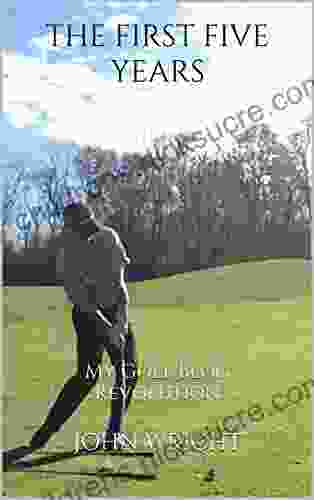
 Ernest J. Gaines
Ernest J. GainesMy Golf Blog Revolution: Open Stance
Are you ready to revolutionize your golf...
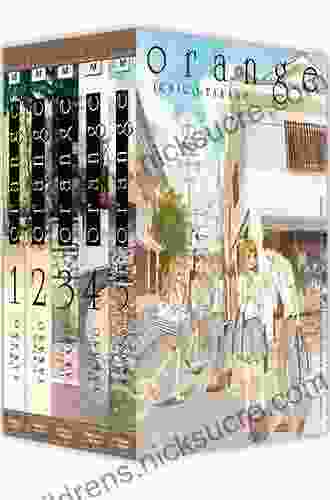
 Gene Powell
Gene PowellThe Unparalleled Genius of Calculus Volume Ichigo Takano:...
: The Birth of a...
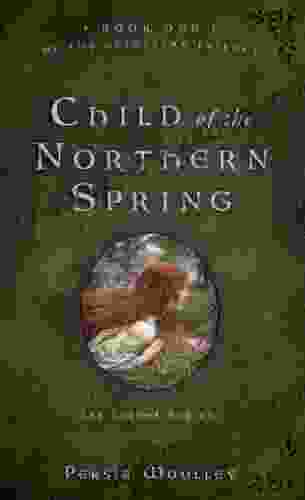
 Edgar Hayes
Edgar HayesChild of the Northern Spring: A Journey of Discovery and...
In the heart of...

 Anthony Wells
Anthony WellsHybrid Aria: A Harmonious Blend of Modern Comfort and...
In the heart of a bustling...
4.5 out of 5
| Language | : | English |
| File size | : | 3349 KB |
| Text-to-Speech | : | Enabled |
| Enhanced typesetting | : | Enabled |
| Word Wise | : | Enabled |
| Print length | : | 450 pages |
| Lending | : | Enabled |
| Screen Reader | : | Supported |


